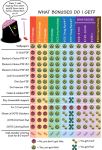In my last post I referred to my ‘love of learning’, my motivation to engage in learning activities as a primary school students would be classified as intrinsic motivation, I would engage in activities at school simply because I enjoyed learning and therefore wanted to learn. Schunk (2009, 499 – 302) describes intrinsic motivation as the desire to engage oneself in an activity solely because that is what you want to do, there are no other factors influencing the wish to participate. There is also extrinsic motivation; an individuals motivation to participate in a task is influenced heavily by external factors. Extrinsic motivation strategies are used throughout traditional state classrooms, for example, rewards, punishment and grading.
Extrinsic motivation is an integral part of behaviourism learning theories. From a behaviourist’s perspective motivation is a product of effective conditioning and reinforcement. Both classical conditioning and operant conditioning use extrinsic factors to reinforce correct behaviour and participation in tasks. The behaviourist perspective explains that a conditioned student will be motivated to engage in future activities because they anticipate the reward if they do so, or the punishment if they do not (Krause, Bochner & Duchesne, 2003, p. 223).
During my practicums I have seen extrinsic motivation tools used extensively to condition the desired response from learners, and in my opinion these tools become very heavily relied on by teachers and students. Strategies widely used such as reward systems, consequences and positive reinforcement can have actually negative impact on children’s experience at school and undermine autonomy. These external factors coheres learners into engaging in an activity and as a result feel pressure or disinterest (Gurland & Glowacky, 2011, p. 3)
The benefits of intrinsic motivation vs extrinsic motivation is widely documented. According to Self-Determination Theory (Ryan & Deci, 2000) two individuals who are equally motivated to complete a task may experience the task very differently. An intrinsically motivated person will complete a task because it is their desire to do so, this individual will experience feelings of autonomy, satisfaction and enjoyment. In contrast an individual who is externally motivated may feel forced, controlled and as if they must complete the task, perhaps to avoid punishment or to receive a reward (Gurland & Glowacky, 2011, p. 2).
Gurland, S. T., & Glowacky, V. C. (2011). Children’s theories of motivation. Journal of experimental child psychology 110(1), pp. 1 – 19
Ryan, R. M., & Deci, E. L. (2000). Self-determination theory and the facilitation of intrinsic motivation, social development, and well-being. American Psychologist, 55, 68–78.
Schunk, D.H. (2009). Learning theories: an educational perspective. NJ, The United States of America: Pearson Education.
- Sticker & Reward Charts
- Punishment for Unacceptable Behaviour
- Grading and Praise


